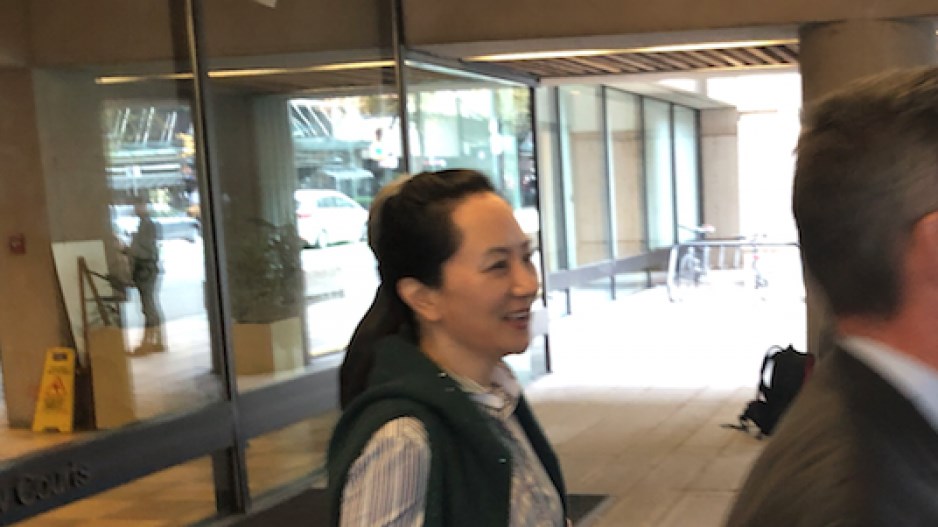A recent Wall Street Journal report that U.S. authorities may be talking with Huawei Technologies Co. Ltd. CFO Meng Wanzhou about a plea deal hints that a political solution to the high-profile extradition case could be in the works, an analyst says.
According to the December 3 report, the U.S. Department of Justice would require the Chinese tech executive – held in Vancouver since December 2018 as she fights extradition to the United States on fraud, money laundering and sanction violations charges – to admit guilt in exchange for the U.S. to drop the extradition request.
The move, which has elicited uniform responses of “no comment” from the U.S. Department of Justice, defence lawyers and Canadian Prime Minister Justin Trudeau, would allow Meng to return to China, ending two years in which Canada’s relationship with China dropped to its lowest point in decades.
Vancouver-based immigration lawyer Richard Kurland said the news does not surprise him. He noted that Crown counsel has tried to paint the Meng case as a routine matter – and the overwhelming majority of extradition requests by the United States result in extradition because they are so routine, Kurland said.
The Meng case, however, is anything but.
Kurland noted that Donald Trump’s comments on the case after Meng’s arrest, in which the U.S. president floated the idea of using the Huawei executive’s arrest as a bargaining chip in trade negotiations with Beijing, put the case in a class by itself.
“It was never intended as a garden-variety vanilla extradition case,” Kurland said. “I think this case is in furtherance of United States’ trade, political and diplomatic priorities, and that’s a far cry from reaching into Canada and putting someone into American jail.
“There’s never been a case like this one where the U.S. president commented on using an extradition arrest like a trade pawn,” he added. “So this is a pure one-off.”
U.S. and Canadian officials have consistently maintained that Meng violated trade sanctions by doing business in Iran through an alleged subsidiary, then moving the proceeds through the U.S. banking system. Prosecutors also accused Meng of lying about that process to banks like HSBC, exposing the bank to sanction penalties in the United States.
Back in the spring, BC Supreme Court judge Heather Holmes dealt Meng her first major defeat in the case, ruling against her on the question of double-criminality, determining that Meng’s alleged crimes were arrestable offences in Canada, a requirement for extradition.
Holmes said in that decision that the Canadian judicial system should respect the extradition request, partly because its basis in sanctions against Iran is “not fundamentally contrary to Canadian values.”
The same line of thinking may determine the court’s path on the ongoing battle over alleged abuse of process. Meng’s main argument is that U.S. authorities are improperly using extradition to detain the Huawei executive in a U.S.-China battle for supremacy in tech advancements such as 5G networks.
“In double criminality, the court was guarding future extradition cases from being susceptible to defence manoeuvres – to keep the gates as wide open as possible in order to safeguard that extradition process,” Kurland said. “In the same vein, [the court] may take that approach to charter issues and abuse of process – that in the future, the system must guard against the institutional collision between the judiciary and law enforcement.
“In that sense, the decision may go the other way in that, if the court ignores this, law enforcement may become too powerful in the same way that the double criminality could have made extradition too difficult.”
The case will continue in March. This fall, 11 witnesses delivered a marathon month-plus stretch of testimony. Holmes had said that she would like the matter to be addressed quickly, but with the Meng defence saying it will extend its abuse-of-process argument, and the Crown slated to produce a new supplemental record of the case, there remain large items of contention between prosecutors and defence that may last well into the latter half of 2021.
That may be why the plea deal reports have emerged, Kurland noted. Canada’s trade with China, its second-largest trade partner, has been hurt by the ban of canola and red-meat exports to China in the last year. Trade officials fear a further delay in the resolution of the case may mean additional Beijing sanctions on products such as peas – a sub-sector that relies on the Chinese market for more than 90% of its total exports.
Washington may also take the opportunity of a new White House administration under president-elect Joe Biden for a reset on its China strategy, Kurland said, which means that the current deal from the U.S. may not be the only deal coming in the case.
“I think [Meng’s] team is in the position of, ‘Do we take deal No. 1, or do we wait for deal No. 2?’” he said. “The way I look at this is that this is the endgame in presidential politics. If that’s where it started, that’s where it’s going to end, frankly.”
Kurland also does not rule out the possibility that Ottawa may exercise its rights to terminate the case under the Extradition Act. •




